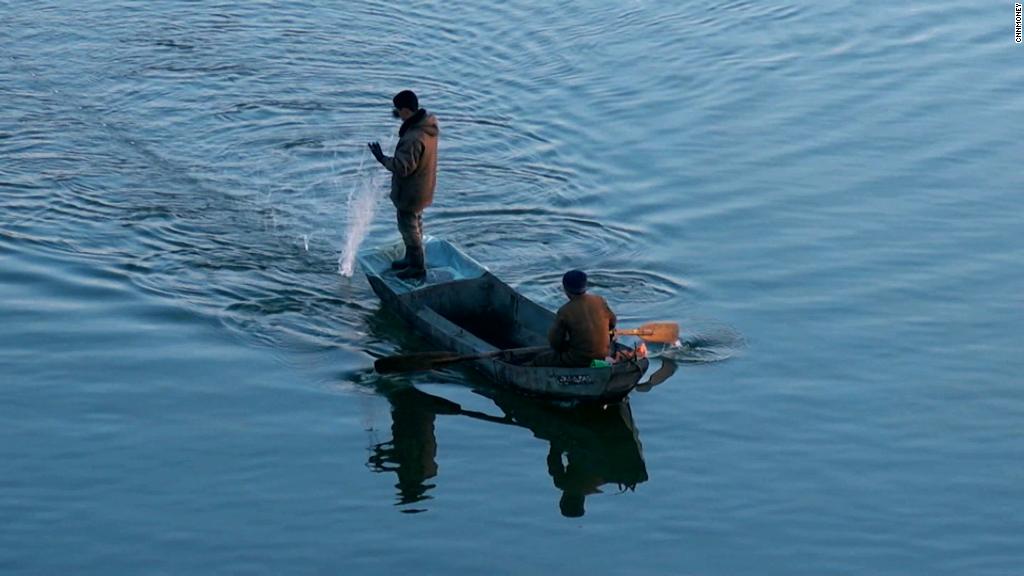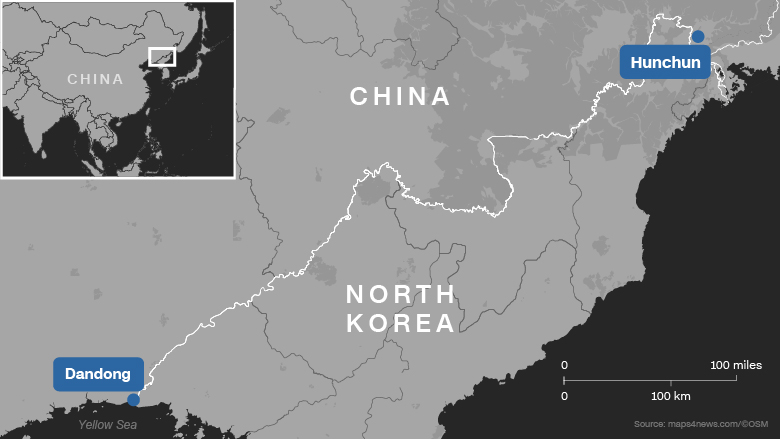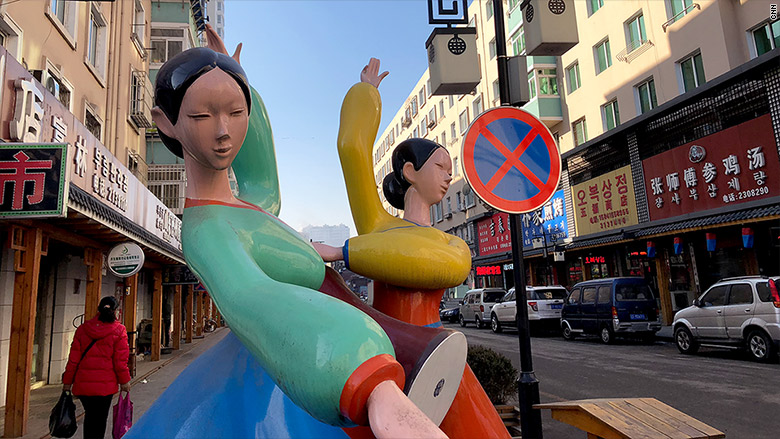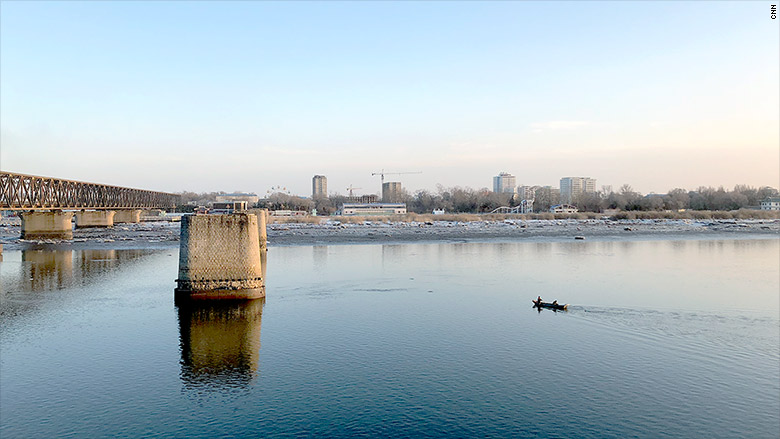
Empty shops. Failing businesses. And bored North Korean officials drinking their days away.
These are the stories being told on the streets of Dandong -- a gritty, frozen city on the banks of the Yalu River, which separates China and North Korea.
For decades, Dandong has been a key trading hub that helped the North Korean regime cash in on China's spectacular economic rise. But now it's suffering as President Trump, alarmed by the rapid development of Kim Jong Un's nuclear weapons program, presses Chinese President Xi Jinping to squeeze North Korea's sources of revenue.
Related: U.S. targets North Korea through China and Russia
Conversations last week with traders, store owners and Dandong residents with ties to North Korea painted a picture of a local economy showing signs of severe stress. Most of the people who talked to CNN suggested the most recent U.N. sanctions against North Korea could deal a devastating blow to an already struggling region.
None were willing to speak on the record for fear of reprisal. Speaking to foreign news organizations about the sensitive China-North Korea relationship in general -- and the impact of recent sanctions in particular -- can bring repercussions, economic and otherwise, from Chinese government officials.
It's all about the sanctions
We spoke with Mr. Liao, a chain-smoking Dandong businessman, near the river. He requested that CNN not use his real name.
"In the beginning, I was importing coal from North Korea," he said, through a haze of smoke. "But then China banned coal imports last year."
In early September, China said it stopped processing North Korean coal shipments in order to implement sanctions passed by the U.N. Security Council in August.
Liao's attempts to shift his business into other commodities quickly failed.
"Mineral products, seafood, agricultural products -- basically all imports have been banned," he said. "I told myself, I'm toast."

Liao's list includes several key revenue sources for North Korea that were targeted by three different rounds of sanctions in 2017. On top of bans on goods, restrictions were also placed on everything from North Korean laborers working overseas to joint ventures with North Korean companies.
The cumulative effect in Dandong has been dramatic and swift, according to several business owners who spoke to CNN.
"I'm in a state of forced retirement," said one woman who has been trading with North Korea for over a decade. "I may have to let my employees go soon."
Related: North Korean ship caught likely violating sanctions, Japan says
A previously bustling row of stores catering to North Korean buyers was almost deserted over a period of several days last week. That's a stark change from what CNN has observed there during several trips to Dandong over the past two years.
The area is known as "Koryo Street," a nickname referencing a dynasty that ruled the Korean peninsula in the Middle Ages. Not long ago, the street was filled with North Korean buyers, eager to sell back home.
"The North Koreans have disappeared," said one shop owner on the block.

One resident in close contact with North Korean commercial diplomats told CNN that they are now at a loose end because many of the business interests they represent have been forced to return home.
"They spend almost their entire days in a restaurant, playing cards and eating and drinking," she said. "There's not much for them to do."
From slack to strict
China is North Korea's dominant trading partner. It has long been criticized by the U.S. and other governments for not strictly enforcing sanctions against the regime in Pyongyang.
The widely held explanation is that Communist China values North Korea as a strategic buffer against a robust U.S. military presence in South Korea and Japan. Officials fear cutting off economic ties that could destabilize the North Korean regime.
A collapse could lead to a refugee crisis on China's border -- and even a unified Korea under a pro-U.S. South Korean government.
Related: 49 countries have been busting sanctions on North Korea, report says
But China has grown angry of late with Kim's persistent testing of nuclear bombs and ballistic missiles. Beijing now sees North Korea's nuclear weapons program as the greatest threat to stability in the region and a risk to the safety and health of Chinese citizens in the region near the two countries' border.
"The U.N. has been sanctioning North Korea forever, but China had never really enforced them," said Mr. Liao. "But this time, China is taking it seriously."
His comments echo earlier remarks from Chinese leaders. Foreign Minister Wang Yi said in August that "China more than anyone will pay a price" for implementing the sanctions.

Trade in goods between China and North Korea was down more than 50% in December from a year earlier, according to official Chinese data. The trend is likely to continue this year.
The sharp decline reflects deadlines set by the U.N. for countries to begin enforcing sanctions. But there are big question marks over the reliability of the Chinese data.
China abruptly stopped reporting how much crude oil it sells to North Korea several years ago even though the fuel is widely known to still be flowing through a pipeline across the border.
Some businesses still dodging sanctions
Critics, including Trump, argue that China could still be doing more to squeeze North Korea's economy.
For example, China has yet to fully crack down on the widespread smuggling operations along its porous 880-mile border with North Korea. The North Korean regime is believed to profit from the activities.
In September, CNN witnessed illegal North Korean seafood being sold openly on streets in the city of Hunchun, another town close to the border.
Related: North Korean crabs in China show challenge facing Trump
And in Dandong, there are still businesses targeted by the sanctions that are trying to stay open.
One popular category of joint Chinese-North Korean business ventures was restaurants, largely staffed by North Korean workers.
Estimates vary, but most experts agree that the restaurants generated, at a minimum, tens of millions of dollars for the North Korean regime each year.
Most of the ones in Dandong appear to have shuttered after the latest sanctions went into effect. But at least one North Korean-linked restaurant remains open.
One customer who was inside told CNN that he was told he could only pay in cash. Chinese banks had dropped clients with North Korean ties, he was told, and credit card transactions could be traced by the government.

Even if Chinese authorities crack down even harder on trade with North Korea, experts say it's far from guaranteed that it will compel the regime in Pyongyang to give up on its nuclear program. And while sanctions could take years to really make Kim and his top officials sweat, North Korea's weapons technology is leaping ahead at a far quicker pace.
A region in crisis
For Dandong, though, the waves of sanctions could not have come at a worse time.
The entire region of northeastern China, including Liaoning province where Dandong lies, is in the midst of a painful period of transition.
Heavy industries like steel have taken a hit in recent years. Bloated state-owned companies are laden with debt and burdened by overcapacity. The Chinese government is laying off hundreds of thousands of industrial workers.
Dandong hasn't been spared. Despite its reputation as a trading hub, manufacturing is still one of the city's largest industries. Dandong's economy shrank 2.2% in 2016, the latest year for which relevant economic data was available.
Related: U.S. warns Hong Kong over North Korea smuggling, money laundering
Instead of helping prop up the struggling region, trade across the North Korean border is now dragging it down further.
Dandong's links to North Korea have brought it other headaches. One of the local lenders, Bank of Dandong, was singled out for U.S. financial sanctions last year.
And in another sign of stress, the company that runs the city's port defaulted on its debt late last year.

What happens next?
Seven local businesspeople who spoke to CNN had varying opinions on what's in store for the rest of this year. Some, like Liao, were pessimistic.
"There is nothing to do anymore," he said. "My company probably won't last long, either."
Others said they were hoping that the situation might improve as a result of the recent talks between North and South Korea and the potential goodwill from the upcoming Winter Olympics in the South.
Experts say that China has in the past enforced sanctions for a period of time, in order to send a message to the North Korean regime, and then slackened off.
Related: Ex-North Korean spy recounts Olympic plot to blow up plane
The Dandong resident with ties to North Korean diplomats said this crisis is more serious than anything she's ever seen before. But she's taking a wait and see approach.
"Perhaps things will return to a normal state if the talks between the Koreas go well," she said.
There was uniform response, though, when CNN tried to ask each resident in the Koryo Street neighborhood about the international politics behind their current woes. Who is most responsible, for instance? Trump, Kim or Xi?
No one would go there.
"I want to say ..." one man began before he was cut off by his wife.
"You crazy?" she snapped. "There's nothing to say."


